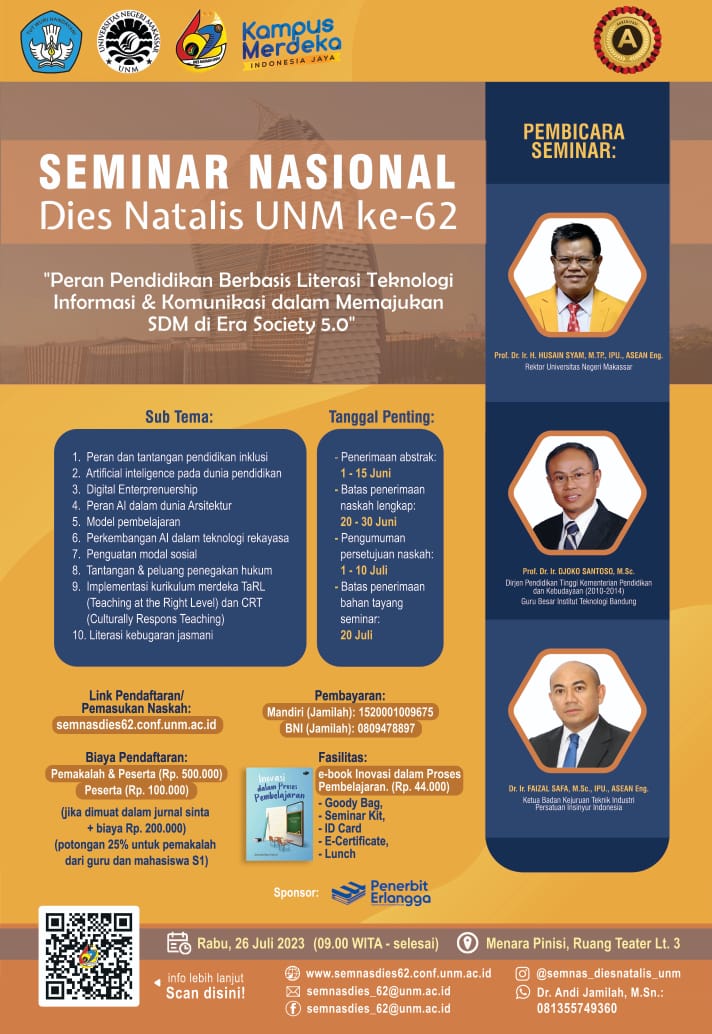PERAN MODAL SOSIAL TERHADAP TINGKAT KESEJAHTERAAN PELAKU INDUSTRI RUMAHAN (PENJAHIT BUSANA) DI KOTA MAKASAR
DOI:
https://doi.org/10.59562/semnasdies.v1i1.813Keywords:
Welfare, Social Capital, Home IndustryAbstract
Micro-scale enterprises are one form of business venture to realize the level of community welfare in a non-formal environment. Home industry actors (fashion tailors) have their own ways of developing their businesses, for this reason this study aims to: 1. determine the transfer of knowledge obtained by home industry actors (fashion tailors) and 2. identify the role of social capital in the welfare level of home industry actors (fashion tailors) in Makassar City. The method in the research conducted was descriptive qualitative, namely with interview techniques, documentation, and questionnaires. The results of the research analysis show that 1. the transfer of knowledge obtained by home industry players (fashion tailors) in Makassar City in Parang tambung Village, Tamalate District is obtained from experience, knowledge and skills learned, attending training conducted by the Department of Labor and Cooperatives, courses and opportunities conducted by several free institutions, joining several tailoring communities and some of them continue the inheritance of parents' businesses that have been carried out, some open their own businesses with capital skills or loans based on education that is relevant to the field being run. And this industrial business is running well with promising profits. 2. the role of social capital on the welfare level of home industry actors (tailors).
Downloads
References
Badan Pusat Statistik. (2020). Indeks Kependudukan Kota Makassar Tahun 2017. BPS Provinsi Sulawesi Selatan
Data dan Informasi Dinas Koperasi dan UNKM Kota Makassar. (2023) dari Kadis Koperasi Kota Makassar
Djaali (2020) Metode Penelitian Kualitatif. Editor: Buga Sari Fatmawati. PT Bumi Aksara
Evi Aprialti, (2021). Dokumen Rancangan Awal Restra 2021-2026. Dinas Koperasi dan UKM Kota Makassar
Erwin Thobias dkk (2013) Pengaruh Modal Sosial Terhadap Perilaku Kewirausahaan (Suatu studi pada pelaku usaha mikro kecil menengah di Kecamatan Kabaruan Kabupaten Kepulauan Talaud) Journal “Acta Diurna” Edisi April 2013
Hasbullah, Jousairi. (2016) Sosial Capital (Menuju Keunggulan Budaya Manusia Indonesia). MR United Press: Jakarta
I Gede Yudiantara dan Ni Nyoman Yuliarmi (2018) Peran modal sosial dan Kur terhadap pengembangan IKM berbasis kearifan lokal dan kesejahteraan. E-Jurnal EP Unud, 8 [4] 907-940 ISSN: 2303-0178
Isma, A., Rakib, M., & Marhawati, S. DF, & M Miftach Fakhri.(2023). Pelatihan Pembuatan Bakso Sayur Bernilai Gizi Tinggi Sebagai Alternatif Peluang Usaha Bagi Ibu Rumah Tangga. TEKNOVOKASI: Jurnal Pengabdian Masyarakat, 1 (1), 51–57.
Karimatunnisa A, Pandjaitan NK. 2018. Peran Modal Sosial Dalam Resiliensi Komunitas Menghadapi Erupsi Gunung Merapi Kalitengah Lor, Desa Glagaharjo, Kecamatan Cangkringan, Kabupaten Sleman, D.I. Yogyakarta. Jurnal Sains Komunikasi dan Pengembangan Masyarakat. 2(3): 332-346
Kiki Joesyiana, (2017) Strategi Pengembangan Industri Rumah Tangga Di Kota Pekanbaru (Studi Kasus Usaha Tas Rajut Industri Pengolahan Kreatifitas Tali Kur) Jurnal Valuta Vol. 3 No 1, April 2017 ISSN : 2502-1419
Ridwan (2007) Skala Pengukuran Variabel-Variabel Penelitian. Alfabeta Bandung
Sugiyono (2018) Metode Penelitian Kuantitatif Kualitatif dan R & D. CV. Alfabeta: Bandung.
Suandi (2017) Modal Sosial dan Kesejahteraan Ekonomi Keluarga di Daerah Perdesaan Provinsi Jambi [Tesis]. Sekolah Pascasarjana IPB. Bogor.
Downloads
Published
Issue
Section
License

This work is licensed under a Creative Commons Attribution-ShareAlike 4.0 International License.











 Email: semnasdies@unm.ac.id
Email: semnasdies@unm.ac.id
